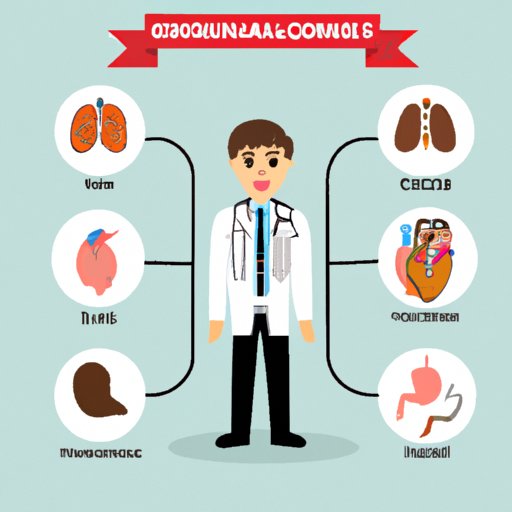Introduction
Internal medicine is a vital specialty in the healthcare industry. These doctors, also known as internists, are trained to diagnose and treat a wide range of diseases and health conditions in adults. They play a critical role in caring for patients and helping them maintain overall health and well-being.
The purpose of this article is to provide a comprehensive guide to internal medicine doctors for patients who may be new to the specialty or curious about their work. We will explore the roles and responsibilities of internal medicine doctors, what to expect when working with them, and their impact on the healthcare system.
The Roles and Responsibilities of Internal Medicine Doctors in Modern Healthcare
Internal medicine doctors work in a variety of settings, from hospitals to private clinics, and treat a wide range of medical conditions. They are responsible for managing both acute and chronic conditions, as well as providing preventive care and health screenings. Internists often collaborate with other healthcare professionals, including specialists, nurses, and pharmacists, to ensure their patients receive comprehensive care.
Internal medicine doctors typically see adult patients of all ages, from young adults to elderly individuals. Some common conditions they treat include diabetes, high blood pressure, heart disease, and respiratory illnesses. These doctors also provide care for patients with complex medical needs, such as those with multiple chronic conditions or infectious diseases like HIV and tuberculosis.
Internists are an important part of the healthcare system, playing a key role in both inpatient and outpatient care. They are often responsible for coordinating care among different specialists and healthcare providers, as well as managing medication regimens and monitoring patients’ progress.
A Guide to Working with an Internal Medicine Doctor
If you are working with an internal medicine doctor, there are a few things you can do to make your experience as smooth as possible. Here are some important tips:
- Bring any relevant medical records or test results to your appointment.
- Prepare a list of questions or concerns you have for the doctor.
- Be honest about your symptoms and medical history so the doctor can provide an accurate diagnosis.
- Follow the doctor’s instructions carefully, including taking medications as prescribed and attending any follow-up appointments or tests.
It’s also important to remember that building a strong relationship with your internal medicine doctor can greatly improve the quality of your care. Don’t be afraid to ask questions or voice your concerns during appointments. Your doctor should be a partner in your healthcare journey.
The Impact of Internal Medicine on the Healthcare System
Internal medicine doctors are in high demand, especially as the population continues to age and more patients require specialized care. These doctors are also instrumental in shaping the future of healthcare through their contributions to research and medical education.
As the demand for internal medicine doctors grows, there is a push to train more physicians in the specialty. Many medical schools now offer internal medicine residencies and fellowships to help meet this demand. Additionally, internal medicine doctors are often involved in research efforts to improve patient outcomes and develop new treatments for diseases.
The History and Evolution of Internal Medicine
Internal medicine has a rich history dating back to the early 19th century. The specialty began as a general practice focused on the care of adult patients, but has since evolved to encompass a wide range of sub-specialties and areas of expertise. In the early days of internal medicine, doctors often made house calls and provided comprehensive care for the whole family.
Over time, the field has become more specialized, with internal medicine doctors often focusing on specific areas such as cardiology, gastroenterology, or infectious diseases. Despite these changes, the overall goal of internal medicine remains the same: to provide high-quality, evidence-based care for adult patients.
Common Procedures Performed by Internal Medicine Doctors
Internal medicine doctors perform a variety of procedures to help diagnose and treat medical conditions. Here are a few common procedures:
- Physical exams: These exams involve a thorough evaluation of a patient’s overall health, including checking vital signs, listening to the heart and lungs, and examining various body systems.
- Imaging tests: Internal medicine doctors may order imaging tests like x-rays, CT scans, or MRI scans to help diagnose conditions affecting the bones, organs, or other parts of the body.
- Biopsies: A biopsy is a procedure used to collect a tissue sample from the body for further testing. Internal medicine doctors may perform a biopsy to diagnose or monitor a variety of conditions, including cancer.
These procedures are typically performed in a medical office or hospital setting. The doctor will explain the procedure beforehand and answer any questions you may have.
Conclusion
Internal medicine doctors are an essential part of modern healthcare. They provide specialized care for adult patients, helping to diagnose and treat a wide range of medical conditions. By following the tips provided in this article, patients can build a strong relationship with their internal medicine doctor and receive the best possible care.
As the demand for internal medicine doctors grows, the field will continue to evolve and expand. But no matter how it changes, the dedication of internists to their patients and the broader healthcare system will remain constant.
